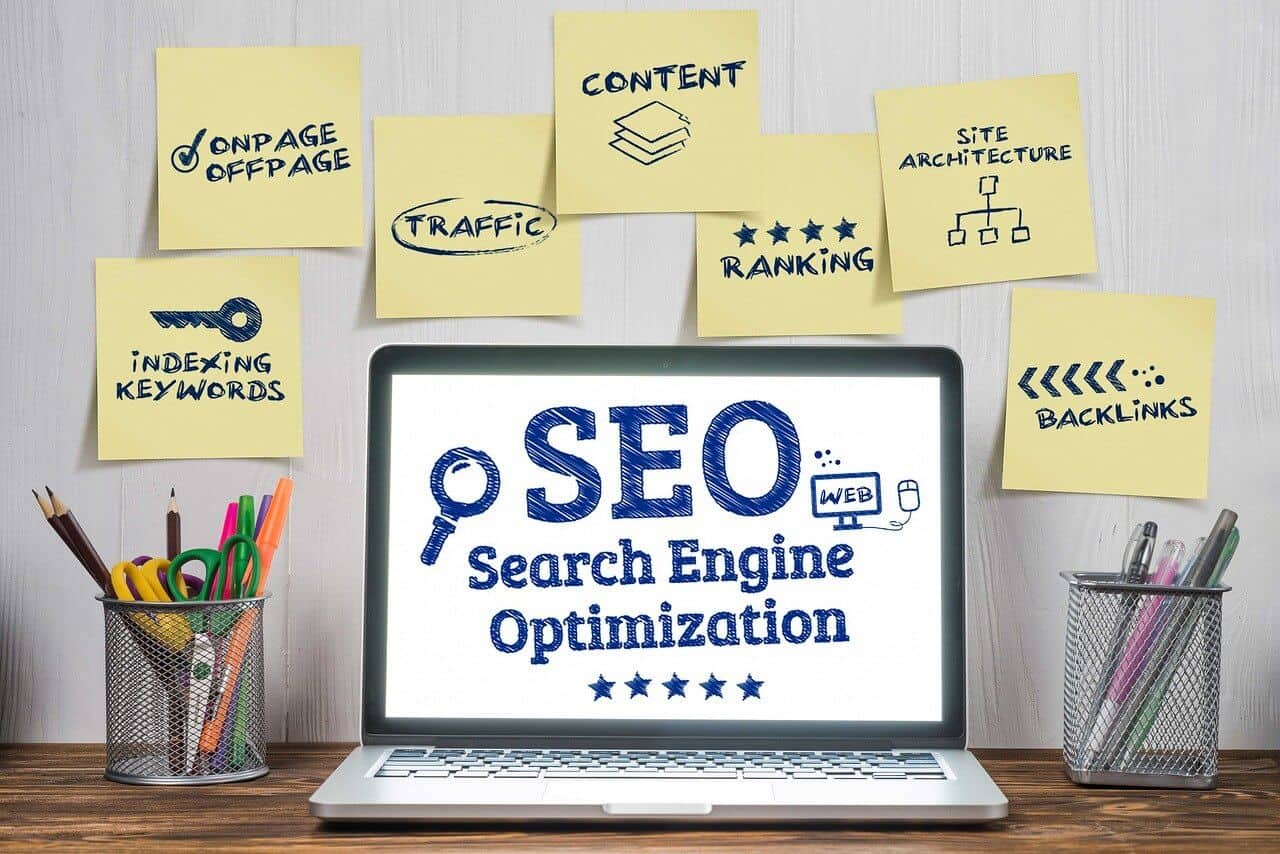There has been a lot of debate lately about which marketing channels are the most effective.
Many experts say that SEO is no longer as important as it was in the past and that social media is the way to go. However, others insist that SEO is still one of the best ways to promote a website and drive traffic.
Truthfully, both have their pros and cons. But before you decide whether to use search engine optimization (SEO) or social media marketing (SMM), it’s essential to understand how they differ from one another, their strengths, and most importantly, your business needs.
This article will discuss the key differences between SEO vs social media marketing and explain how you can use these two strategies together for your business goals.
But first.
What is Search Engine Optimization (SEO)?
SEO, or search engine optimization, is a process that helps websites rank higher on search engine results pages (SERPs). It’s the process of optimizing content to appear more prominently in search results when someone searches for relevant keywords.

(Pixabay)
The goal of SEO services is to have as many visitors as possible click on your site when they search for something related to your business or product.
For example, if you have a bakery, you might want people to find you when they type “cheap cupcakes” into Google.
To rank well for those keywords, you need to optimize your content to be relevant to them.
You can accomplish this through a keyword tracking tool, which involves finding out what people search for and using those words in your content.
Another important aspect of SEO is building backlinks. Backlinks are links from other websites that point to your site, signaling to search engines that your content is trustworthy and valuable. You can acquire backlinks through various strategies, such as guest posting, reaching out to influencers, and participating in online communities. Some businesses even opt for backlink outsourcing services to streamline this process and enhance their website’s authority. When considering SEO strategies, it’s crucial to understand how it applies to different sectors. For instance, SEO for Higher Education requires targeted keywords, such as “online degrees” or “campus tours,” to attract prospective students actively searching for educational programs. Tailoring content to these specific keywords can significantly boost a university’s online visibility.
What is Social Media Marketing (SMM)?
Social media marketing (SMM) promotes a brand or product through social media channels.
Social media marketing is a way to engage with your target audience, leading to greater sales and a better reputation for your business.

(Pexels)
Social media marketing can be done on various platforms, including Facebook, Twitter, Instagram, and LinkedIn.
SEO vs Social Media Marketing: What’s the Difference?
Search engine optimization (SEO) and social media marketing are forms of digital marketing that help businesses grow their online presence.
While they have similar goals, it’s crucial to understand how each approach differs in choosing the right strategy for your business.
Let’s find out.
1. Types of Content
There are two types of content that can be used in SEO and SMM – text-based and visual.
Text-based content is essentially anything you can read on a screen, including blog posts, articles, FAQ pages, case studies, etc. Visual content includes images, videos, infographics, etc. And video is king as well when it comes to visual content so be sure to make it part of your overall strategy.
SEO uses both text-based and visual content to help boost the ranking of your website in search engines like Google.
On the other hand, social media uses only text-based content and can be posted anywhere on the internet (e.g., on social media platforms such as Facebook, Twitter, and Instagram).
2. Target Audience
SEO and SMM are both crucial strategies for marketing your business, but they serve very different purposes.
When considering how to use these strategies, it’s essential to understand the difference between their audiences.
SMM is great for reaching people who are already interested in your business or brand. You can use it to reach out to existing customers, connect with potential buyers, or engage with people who have an interest in your product or service.
Overall, SMM is great for getting people who are already interested in what you have to say.
On the other hand, SEO is designed to attract new visitors to your website through search engines.
SEO could be what you need if you want more people to see what you have to offer online, but only if they’re not already familiar with you.
3. Success Rate
Though there are many differences between SEO and SMM, the most significant is the time it takes to see results.
SEO takes a long time to show results. It can take months or years before you start seeing traffic from your SEO efforts. For example, if you want to rank for keywords like “SEO services” or “SMM software,” it might take more than two years before you start seeing any actual results.
On the other hand, SMM can show results in as little as 24 hours. If you run an ad through Facebook, Twitter, or Instagram, you’ll see an immediate increase in engagement and followership.
4. Longevity
SEO can be considered a long-term strategy that can bring massive traffic to your website for months or years.
You can also write new content on your website, which will help you to improve your ranking on search engine results pages (SERPs).
On the contrary, SMM is a short-term technique for getting instant traffic, but not all of it will stay for a long time.
The more active you are on social media, the better it will be for your business. But after some time, people start ignoring your posts, and they stop following you.
5. Measuring Results
Search engine optimization is a process that helps drive traffic to websites, measured by the number of visitors and how many convert into customers or sales leads.
In addition to these metrics, SEO can also be measured by using Google Search Console or a pro tool like Accuranker & Serpple to look at qualitative data such as ranking position changes over time, keyword rankings, and organic search traffic trends based on search query data.

(Pexels)
Social media results are much harder to measure because there isn’t one specific metric that tells us how well your campaigns are performing over time. Instead, it would be best to rely on multiple metrics, including impressions and customer engagement.
SEO Benefits Over Social Media
1. SEO is free, and social media is not
SEO, or search engine optimization, is a process that improves your website’s ranking in search engines like Google.
SERPs (search engine results pages) are ranked based on their relevance and value to users.
By optimizing your website with keywords and related factors, you can increase its search engine ranking, resulting in more visits.
SMM, or social media marketing, uses pay-per-click advertising to generate leads and drive sales.
Paid ads have higher visibility than organic results and can be seen by millions of people every day.
However, this visibility comes at a cost: You need to pay each time someone clicks on your ad.
2. SEO gives you long-term ROI; SMM doesn’t
SEO is all about building a long-term relationship with your target audience, while SMM is more of a short-term investment.
SEO gives you a better ROI in the long run because it works to increase your organic traffic and leads.
SMM can be an effective way to drive immediate sales and boost your conversion rate, but it doesn’t have any long-term benefits for your business.
So, if you want to grow your business over time, SEO is the way to go. Moreover, investing in SEO provides long-term benefits for your business, as it helps increase your website’s visibility and organic traffic, making it a valuable SEO investment for sustainable growth.
3. SEO provides more traffic than social media
SEO, or search engine optimization, uses specific strategies to help your website rank higher in search results. It’s a great way to get more traffic to your site. Using automation tools for backlinks can boost this process even more by streamlining outreach efforts and ensuring a consistent, high-quality link-building strategy. For instance, using a backlink automation tool (Linkee) can save time, improve targeting precision, and help scale your backlink acquisition efforts, ultimately leading to higher rankings and more organic traffic.
Social media marketing is also a great way to get more traffic to your site by building an audience who will share your content with their friends and followers.
This can result in many eyeballs coming across your content—but it’s not as direct as SEO.
4. SEO allows you to rank for niche keywords, and social media doesn’t
SEO and social media are both critical for marketing your products and services. Still, SEO is more effective because it allows you to focus on specific keywords instead of relying on organic reach.
With SEO, you can target certain keywords that relate to your business and products, which means that the chances of someone finding your content organically are much higher.
Social media is all about the number of followers/likes/etc. If you have a small following or low engagement, it is unlikely that anyone will find your content organically.
5. SEO has a lower cost per click (CPC) than social media
While social media may be an effective way to get your brand out there, it can also be a costly venture. Search engine optimization (SEO) is a more affordable option for companies looking to increase their online visibility.
Social media advertising can be expensive because it requires you to pay for every click on your advertisement.
In addition, you will also have a large number of people who see your ad but do not click on it. This can be a costly way to advertise since you are paying for impressions that do not lead to sales or leads.
The good news is that SEO has a lower cost per click (CPC) than social media advertising because the ads are only displayed when users search for specific keywords and phrases related to your business or product line.
Social Media Benefits Over SEO
Now, let’s take a look at the benefits of social media marketing over search engine optimization.
1. More targeted audience
Social media marketing can be used to target specific groups of people who may be interested in your products or services.

(Pixabay)
You can create posts that will appeal to this group, which is more effective than broadcasting your message.
For example, suppose you are a real estate company and want to market homes in Florida. In that case, you can target people who live in Florida on Facebook or Twitter and send them targeted ads about Florida real estate.
2. Social media gives faster results
Social media results are much faster than those from SEO because they’re immediate and direct, allowing you to see how well your campaign is working immediately after it goes live.
With SEO, it can take months before any results appear and sometimes longer than that.
3. Better engagement
SEO content tends to be more informational and self-promotional.
On the contrary, SMM content tends to be more conversational and user-focused. This makes it easier for users to engage with your brand on social media platforms and share their experiences with others.
4. Increased visibility
Social media platforms give you unlimited exposure as long as you know how to leverage them properly.
Millions of people visit social media sites every day, so anything posted here will be seen by thousands of people instantly. Not only that, but they’re an effective way to promote your business.
5. Flexibility
Social media is not just one thing — it’s an entire ecosystem of platforms with different audiences and ways of communicating.
You can choose the channel that works best for your business at any given time, depending on what kind of content you want to share, what kind of audience you want to reach, or what kind of response you want to get from your followers.
Integrate SEO with Social Media for Better Results
SEO and social media marketing are two of the most crucial marketing channels. But what’s better—SEO or social media?
Well, it depends on your goals.
SEO is probably better for you if you look to rank in search results and drive traffic to your website. However, if you want your content to go viral, social media is where it’s at.
So, why not try both? To maximize your exposure, try to get the best of both social media and search engines.
Use social media to reach your audience and search engines to grab visitors searching for topics similar to yours.
Here are some tips for combining the two to get the best results:
1. Recognize that each channel has its purpose
If you’re using social media to promote your business, it’s essential to understand the difference between each channel.
While some people use Facebook to promote their business and others use Twitter. Ultimately, there is no one-size-fits-all approach for social media marketing.
2. Re-share older content to keep it relevant
The truth is that your audience wants relevant content from you — not necessarily new content.
With this in mind, it’s crucial to repost older blog posts and other types of content that are still relevant to your target audience.
This will help keep older content alive and boost traffic to your website or blog from these channels.
3. Find the proper times and days to post
The most effective time to post on social media is when your audience is most likely to see it.
Many tools can help you determine what times of day or days of the week are most famous for posting, including Bulk.ly.
The tool also allows you to schedule posts in advance to appear at the optimal time.
4. Write social media posts based on keywords
Keywords are words or phrases that people search for online. Include them in your content if you want to be found by people searching for those terms.
You can use tools like SE Ranking, SEMrush, or Ahrefs to determine how many searches a particular keyword receives each month, how much competition there is, and how much traffic a website gets.
5. Optimize all social media profiles
The first step to getting the most out of your SEO and social media marketing is to ensure that every profile on every platform has been optimized for search engines. This means using your website’s proper titles, descriptions, keywords, and links.
6. Social shares are powerful ranking signals
Social shares can help improve your ranking in Google’s organic results because Google uses them as a strong signal of relevance for its algorithm. A SaaS link building agency can capitalize on this by creating engaging content that encourages social sharing, thereby boosting its clients’ rankings. Additionally, integrating social media campaigns with SEO strategies can enhance overall online visibility and brand authority, fostering a holistic approach to digital marketing.
If someone likes or comments on one of your posts, Google will note it and boost its importance in the overall ranking equation — even if they don’t share it publicly!
7. Link back to your website
When you’re posting content on social media sites, make sure that it links back to your website so that people can find out more about what you’re offering or learn more about your brand in general.
This will help increase traffic to your site and improve its ranking on search engines like Google.
Wrapping Up SEO vs Social Media
To increase your business’ exposure and acquire new customers, you need to use SEO and Social Media.
However, which one should you use?
In my experience, using both SEO and Social Media has helped me earn customers and generate revenue for companies I have worked with.
The two options have their strengths and weaknesses. If you have little money to market your business, consider these options to see if either one will produce the results you are looking for.


